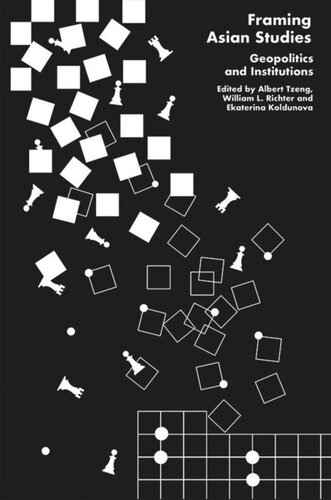

Most ebook files are in PDF format, so you can easily read them using various software such as Foxit Reader or directly on the Google Chrome browser.
Some ebook files are released by publishers in other formats such as .awz, .mobi, .epub, .fb2, etc. You may need to install specific software to read these formats on mobile/PC, such as Calibre.
Please read the tutorial at this link: https://ebookbell.com/faq
We offer FREE conversion to the popular formats you request; however, this may take some time. Therefore, right after payment, please email us, and we will try to provide the service as quickly as possible.
For some exceptional file formats or broken links (if any), please refrain from opening any disputes. Instead, email us first, and we will try to assist within a maximum of 6 hours.
EbookBell Team

4.4
72 reviewsThis book explores the interconnection between geopolitical context and the ways this context frames our knowledge about Asia, highlighting previously neglected cause–effect relations. It also examines how various knowledge institutions promote and shape Asian Studies. The authors seek to explain why Asian Studies and its subfields developed in the way they did, and what the implications of these transformations might be on intellectual and political understandings of Asia. The book not only builds on the current debates on the decolonization and de-imperialization of knowledge about Asia; it also proposes a more multifaceted view rather than just examining the impact of the West on the framing of Asian Studies. “This timely and valuable collection is the best analytical and substantive guide we have to the great diversity of changing geopolitical contexts which have shaped the modern production of knowledge about Asia, before, during, and after the Cold War, on both sides of the Atlantic, and also in Australia, Russia, Lithuania, India, Japan, Korea, and Southeast Asia.” —David Ludden Professor and Chair, Department of History, New York University “This book is an important addition to the growing number of works on Asian and Southeast Asian studies that seek to take stock of how area studies concerning the region have been developing and what its trajectory is. This book takes a critical view of these developments by going beyond the geopolitical backdrop, contextualising Asian studies in terms of its colonial and Orientalist roots, and bringing attention to the critical reactions to these problems of knowledge production. The book is unique in that it not only looks at Asian studies in the West, but also examines the field in the former Soviet Union as well as within the Asian centres of research.” —Syed Farid Alatas Professor, Department of Sociology Faculty of Arts & Social Sciences, National University of Singapore “Asia, a combination of geo-cultural sites without obvious borders of any kind, is un-learned and re-learned in this timely book via an array of Anglo-Euro-Asian scholarship on knowledge. Anyone determined to move beyond pedagogical categories must engage with this transnational project.” —Chih-yu Shih Professor, National Taiwan University